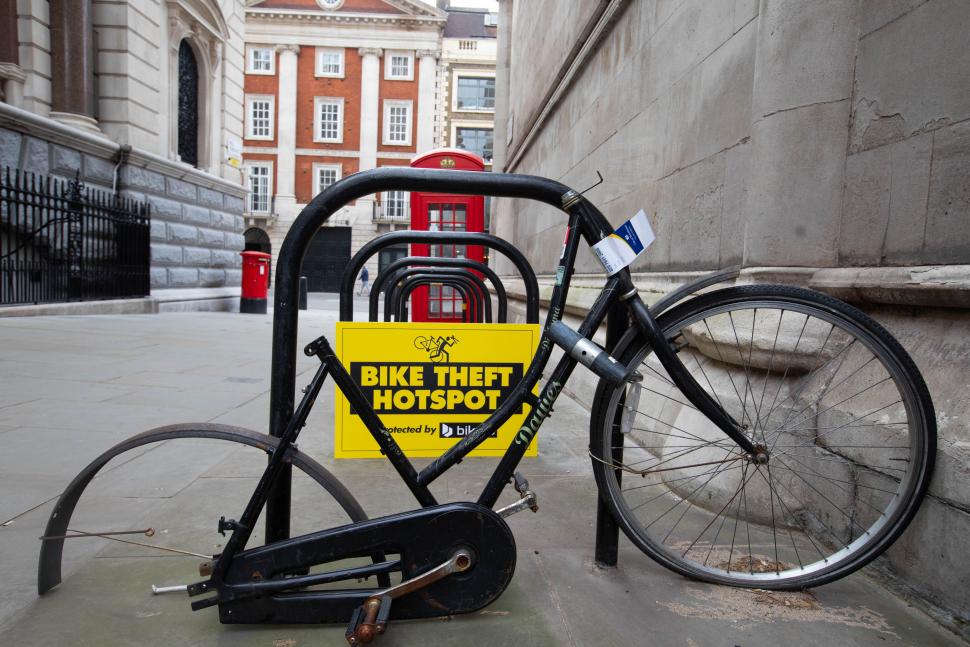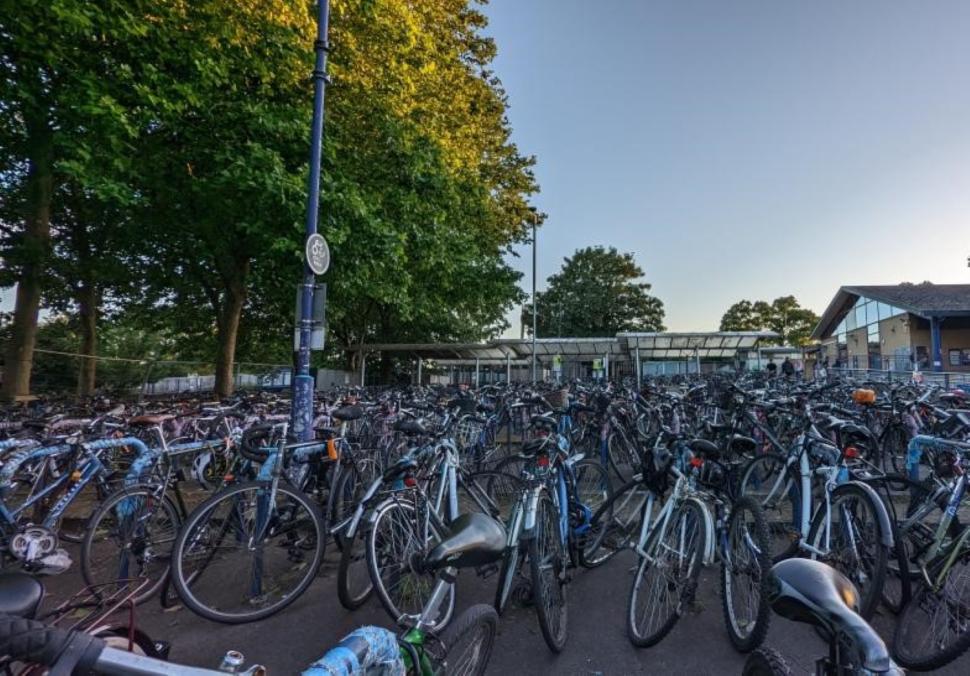- News
- Reviews
- Bikes
- Components
- Bar tape & grips
- Bottom brackets
- Brake & gear cables
- Brake & STI levers
- Brake pads & spares
- Brakes
- Cassettes & freewheels
- Chains
- Chainsets & chainrings
- Derailleurs - front
- Derailleurs - rear
- Forks
- Gear levers & shifters
- Groupsets
- Handlebars & extensions
- Headsets
- Hubs
- Inner tubes
- Pedals
- Quick releases & skewers
- Saddles
- Seatposts
- Stems
- Wheels
- Tyres
- Tubeless valves
- Accessories
- Accessories - misc
- Computer mounts
- Bags
- Bar ends
- Bike bags & cases
- Bottle cages
- Bottles
- Cameras
- Car racks
- Child seats
- Computers
- Glasses
- GPS units
- Helmets
- Lights - front
- Lights - rear
- Lights - sets
- Locks
- Mirrors
- Mudguards
- Racks
- Pumps & CO2 inflators
- Puncture kits
- Reflectives
- Smart watches
- Stands and racks
- Trailers
- Clothing
- Health, fitness and nutrition
- Tools and workshop
- Miscellaneous
- Buyers Guides
- Features
- Forum
- Recommends
- Podcast
news
 Bike theft hotspot sign (Bikmo)
Bike theft hotspot sign (Bikmo)Cambridge tops list of UK cycle theft hotspots, new crime data analysis reveals – as large student population and cycling culture blamed for “thriving” bike theft environment
Oh look, it’s Cambridge and Oxford, battling it out for the top spot of an annual, eagerly anticipated UK ranking table. And no – as any cyclist in those cities will know all too well – I’m not talking about that ranking table. Instead, for what feels like the umpteenth time, Cambridge has been crowned the city where you’re most likely to have your bike stolen, according to new crime data analysis.
Using crime statistics data from the Office for National Statistics (ONS), e-bike company Aventon complied a table ranking local authorities in England and Wales by the number of bikes stolen per 1,000 people.
“We wanted to find out which UK regions pose the highest theft risks for bicycle owners,” a spokesperson for the brand said in a statement. “By understanding these patterns, we hope to raise awareness and help cyclists better protect their investments.”
> “It makes you feel powerless” – victims in UK's bike theft capital share their frustrations
According to this analysis, Cambridge saw the most bike thefts per capita in 2023, with eight bikes stolen per 1,000 people, and 1,228 nicked in total for the year.
“The large student population, coupled with a culture that encourages cycling as a primary mode of transport, creates an environment where bike theft can thrive,” Aventon’s John Vinton said.
“With so many bikes on the road, opportunistic thieves can easily blend in, making it difficult for authorities to track stolen bicycles.”
Following closely behind Cambridge was, naturally, Oxford, where 1,198 bikes were reported stolen in total, accounting for seven per 1,000 people in the city.
Hackney, meanwhile, was third with five bike theft per 1,000 people and 1,276 total stolen bikes, with Hammersmith and Fulham, Westminster, York, Camden, Tower Hamlets, Cardiff, and Bristol rounding off the top ten.
Given those numbers, it’s perhaps unsurprising that earlier this year, the Liberal Democrats warned that bike theft in the UK has been effectively “decriminalised”, after analysis of Home Office data found that nine in 10 cases reported to the police since 2019 had gone unsolved.
After publishing its own analysis of crime figures, the party’s home affairs spokesperson Alistair Carmichael called the figures “shocking” and cause for cyclists to be left “wondering if bike theft has been decriminalised”.
The Lib Dems’ analysis found that, of all bike thefts reported to the police since 2019, 89 per cent (more than 365,000) have gone unsolved, pointing to more than eight reported bike thefts an hour and 200 per day going unsolved in England and Wales over the past four years.
And while the data suggested 11 per cent of reported cases are solved, just two per cent (8,437) resulted in an arrest and charge for the perpetrator. That figure fell from three per cent in the year to June 2019, reported bike thefts also down from 97,800 in that year to between 74,000 and 78,000 in the three years since.
The overall picture, of course, is doubtlessly worse than that, with analysis like the ones reported on in this story only taking into account bike thefts that are actually reported to the police, with the British Crime Survey suggesting there are in fact around 300,000 bike thefts a year.
Sarah McGonagle, director of external affairs for Cycling UK, has noted previously that the “huge social impact” of bike theft, which is “sometimes perceived as a petty crime”, should be viewed as one of the key factors “putting many people off cycling altogether”.
After obtaining a PhD, lecturing, and hosting a history podcast at Queen’s University Belfast, Ryan joined road.cc in December 2021 and since then has kept the site’s readers and listeners informed and enthralled (well at least occasionally) on news, the live blog, and the road.cc Podcast. After boarding a wrong bus at the world championships and ruining a good pair of jeans at the cyclocross, he now serves as road.cc’s senior news writer. Before his foray into cycling journalism, he wallowed in the equally pitiless world of academia, where he wrote a book about Victorian politics and droned on about cycling and bikes to classes of bored students (while taking every chance he could get to talk about cycling in print or on the radio). He can be found riding his bike very slowly around the narrow, scenic country lanes of Co. Down.
Latest Comments
- Rekrab 16 min 31 sec ago
MORE LANES, MORE LANES!!!!
- Simon E 23 min 11 sec ago
The numbers don't tell anything like the whole story....
- Simon E 54 min 17 sec ago
Just squirt some thick grease all over his side windows and door panels. If you're feeling really uncharitable you could throw some sand at the...
- David9694 1 hour 34 min ago
check under 'W'for "What cars do to people"
- quiff 2 hours 14 min ago
Fascinating - I have always thought Hersheys has a whiff of vomit about it!
- Global Nomad 2 hours 15 min ago
good to see you're testing the farsports wheels - hope to see road.cc continue to expand the range of brands it considers. These or the shallower...
- chrisonabike 2 hours 18 min ago
Duly triggered! (At least "it's comedy!" though)....
- quiff 2 hours 19 min ago
Agreed, though those in thrall to the car lease would probably think the same of my coffee expenditure...
- chrisotherwise 2 hours 49 min ago
Sadly very normal. And the sand contains loads of evil little shards of flint.


Add new comment
9 comments
And that's just the bikes that have been reported stolen.
Per capita thefts isn't all that useful a metric as it doesn't take into account levels of bike ownership. Cambridge is probably the cycling capital of the UK. You can't steal bikes if there aren't any.
Many, many years ago I was chatting to a road safety officer from a north London borough who said to me - with a straight face - that their Borough doesn't install any cycle infrastructure becuase they don't want to encourage cycling as it keeps the KSI statistics low and makes the Borough look one of the safest in the country for cyclists.
This is after a fashion how the UK's road safety numbers have ended up so good. As the roads have become unpleasant for vulnerable road users we have implemented "pedestrian safety" measures which trade safety for convenience. Move the people out of the way of the motor vehicles (while allocating ever more space to those vehicles).
Hey presto! Fewer journeys walked and cycled - fewer people killed or injured doing so.
Of course it's also that driving has become the main transport mode. Then car manufacturers have made cars safer (for those inside), and the authorites have spent our tax on making it safer for people to drive poorly and excellent medical care when they crash.
That made me think of that "Hot Fuzz" comedy movie... so many truths in it.
Road.cc: "Cyclists are fed up of victim blaming"
Also Road.cc: "large student population and cycling culture blamed for “thriving” bike theft environment"
"Bike theft hotspot"?
This is just like having a sign that says
"Police don't bother enforcing the law in this area. Thieves you have free reign!"
"cycling culture blamed for “thriving” bike theft environment"
It's a bit click baity headline as the speaker didn't appear to use the word blame. But never the less it seems a bit odd that criminal behavior, the lack of Police action or the government effectively decriminalizing bike theft don't get the blame.
Shurely "Place with large concentrations of bikes (and presumably thriving second hand market) in bike theft hotspot shock"?
You're quite right though - after a while unpunished crime doesn't even seem like crime (to the criminals).